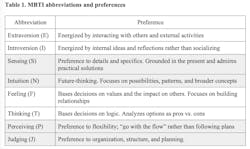Understanding personality types with Myers-Briggs helps dental hygienists in their job
What you'll learn in this article
- Which dental specialties best suit extraverts, introverts, and other types?
- Sensing and intuition shape hygienists’ diagnostic and treatment approaches.
- Thinkers and feelers excel in different dental practice settings.
- Judgers and perceivers thrive in structured or flexible roles.
- MBTI boosts trust, communication, and personalized patient care.
Relationships are cultivated by our ability to understand another person’s point of view. Perspective helps dental hygienists understand why people act certain ways, and breeds compassion in complex case management.
How can we fully get to know our own humanity and mindfulness to meet the needs of our patients? By undertaking assessments such the Myers-Briggs Type Indicator (MBTI).1 The MBTI is a good screening assessment used to explain the natural personality of a person, especially in health-care environments that drive the patient-provider experience.
How dental hygienists get to know coworkers and patients
Created by Katharine Cook-Briggs and Isabel Briggs-Myers,1 the MBTI is based on the findings of psychiatrist Carl Jung.1 The assessment was designed to improve workplace decision-making, communication, understanding, and perspective. It prioritizes the mindset of knowing one's personality type to foster an appreciation for growth potential in the domains of weakness, strengths, relationship-building, and communication.1
The MBTI summarizes a person’s personality type to represent energy management and expression, knowledge discovery, external orientation and neurological processes, and decision-making. These include extraverted (E)/introverted (I), sensing (S)/intuition (N), feeling (F)/thinking (T), and perception (P)/judgment (J).1 Based on combinations, there are 16 distinct 16 distinct MBTI personality types. Table 1 is a summary of each type.1
Hygienists who know their type can better understand workplace stressors, their reactions, how to communicate their perspective, and potential solutions. In dentistry, dental hygienists can practice in any setting they choose; however, some workplaces may be better suited for specific MBTI abbreviations, including:
- Dental specialties that are high energy with a lot of social interaction are better suited to extraverts. Pediatric dentistry is a good fit for extraverts due to the energy required to engage with children, parents, and other collaborative team members.2 Pediatric settings often foster long relationships that use several techniques, skills, and activities across the continuum of oral care.
- Sensing and intuition components calibrate how a person absorbs and processes information. Everyone uses both components, but the MBTI domain determines which is most favored. In dentistry, both traits are necessary to be an effective hygienist. Observations are based on senses, but intuition helps diagnose and treat oral disease. Intuitive-leaning hygienists focus on patterns and possibilities that may solve overarching issues impacting dental hygiene. Public health settings that seek to solve oral health disparities at a community level may be a good fit for them.2
- Being a thinker is not a reflection of intelligence, and being a feeler is not a reflection of emotional stability. Hygienists make logical decisions based on scientific fact but must also remain empathetic toward patients. Clinicians who lean toward thinking are better suited for settings that garner less patient interaction, such as research or sales.2
- Judgers thrive with structure. Judgers, both metaphorically and literally, live by the motto, “Early is on time, on time is late, and late is unacceptable.” Perceivers have a natural tendency to feel comfortable managing the unknown. Independent hygiene practice settings or temping roles are more likely to intrigue perceivers due to the unpredictable situations that arise, in addition to the excitement these roles offer.2
Ultimately, in knowing ourselves, hygiene clinicians can recognize traits in others and adjust their communication style based on cues. The ability to typeflex can improve workplace and patient interactions,2 regardless of setting, and stems from the dynamic of knowing me to know you.
Using MBTI domains improves outcomes and communication
Recognizing and understanding the unique types of MBTI can improve patient outcomes. Knowledge from MBTI can be applied to improve the following elements in hygiene care:
Improved communication: Use of MBTI can improve communication through trait-specific tailoring. Resources and oral hygiene education materials can be adapted by preference for improved knowledge and case adherence. For example, sensing-leaning patients may prefer more detailed oral health explanations with written resources, whereas intuitive ]clients may prefer a more concise overview. Using MBTI skills can reduce misunderstandings in oral care settings.
Climate of trust: Trusting relationships are essential in hygiene practice. MBTI can be applied to build rapport and reduce dental anxiety. When patients feel understood, satisfaction increases. The patient-provider relationship can be strengthened via MBTI as hygienists can provide additional reassurance based on a patient’s personality type.
Improved collaboration: Knowing MBTI types can drive better collaboration and communication in interprofessional teams, leading to improved coordination of patient care. Moreover, application of MBTI in hygiene can mitigate conflict among teams and patients where personality differences impact efficiency. MBTI can address these differences and help create effective resolutions.
Patient-specific care planning: Use of MBTI can help hygienists identify barriers to treatment adherence or acceptance based on a patient’s personality cues. Clinicians can adapt care strategies for improved compliance. Lastly, by recognizing the dominant energy expressions among patients, hygienists can tailor therapies to a patient’s specific needs.
References
1. Our framework. 16 Personalities. https://www.16personalities.com/articles/our-theory
2. The Myers-Briggs Company sample report. 2014. https://www.themyersbriggs.com/en-US/Products-and-Services/Sample-Reports
About the Author

Lisa Watson, MSCI, RDH
Lisa holds a Bachelor of Arts in Community Health, and a Master of Clinical Science in Advanced Healthcare Practice from Western University in London, Ontario. Since 2007, she has held various roles in dentistry, including clinical, academic, and community liaison positions. Lisa can be reached at [email protected].

